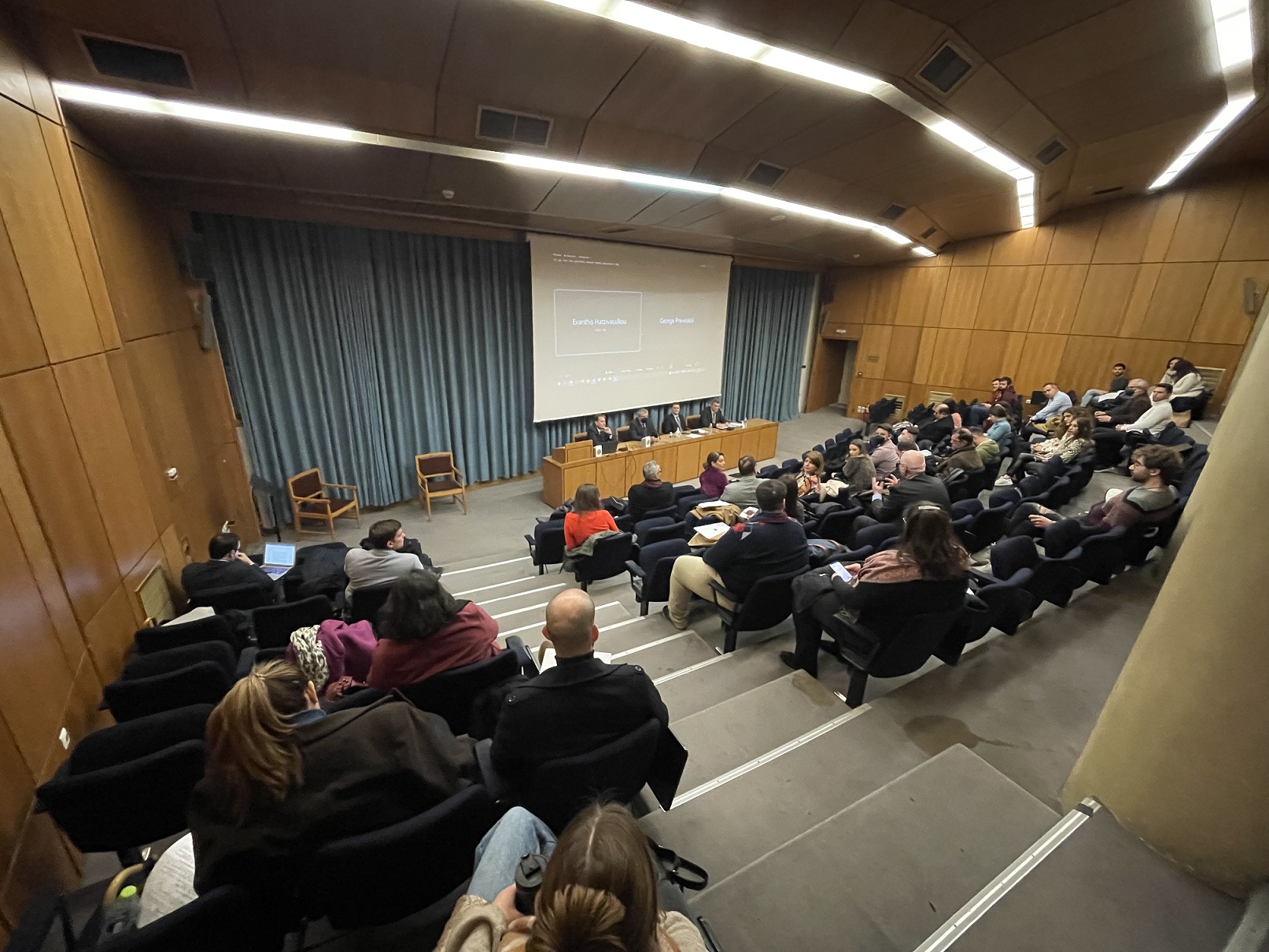CIEPEG- ENoP Athens Conference
The Centre of International and European Political Economy and Governance Policy of the University of Peloponnese and the European Network of Political Foundations organized an Athens conference on migration, on Monday the 28th of November.
During his speech, the Mayor of Lesvos Mr. Spyros Galinos said that the Aegean Sea islands were effective in managing the first wave of the migration crisis, taking into consideration the grave financial difficulties they face, contrary to the central government which has proved less effective and efficient in handling the situation. Regarding the EU-Turkey agreement, he commented that it is in a positive direction, but practically cannot be fully implemented, since Turkish President Erdoğan has confessed that his country controls the migratory flows. He also expressed the opinion that hospitality and integration of refugees can be managed by the local communities. But this target can be only accomplished if there is a proportional allocation of refugees, not only in Greece but also in a European level, since no country can face alone this crisis. “Europe must follow the path of solidarity” he pointed out.
Professor Antonis Kontis, Director of the Institute for Migration and Diaspora Studies, (National and Kapodistrian University of Athens), assessed positively the EU – Turkey agreement, despite the problematic institutional profile of the neighboring country. He emphasized that the implementation of the agreement is crucial not only for Greece but also for Europe in general. He suggested the promotion of new agreements between E.U. and developing countries, taking advantage of the new financial instruments and he also proposed better cooperation between the EU countries, focusing on new managing tools of refugee-migratory flows.
The Content Manager of “diaNeosis” research institute, Mr. Thodoris Georgakopoulos presented the findings of a 2016 research: “The refugee issue and the Greeks”. According to the findings, most Greeks appear to underestimate the problem and have limited knowledge on the issue. A sense of disappointment towards central governmental and European authorities due to their “inertia” is shared among research participants, while there is a positive assessment of NGOs, the Hellenic Coast Guard and islands’ inhabitants. According to Mr. Georgakopoulos the attitude of Greeks towards the refugees is overall sympathetic, demonstrating a sense of solidarity. Indeed, a considerable percentage (68% of participants) responded that they have directly assisted refugees in different ways.
The Secretary General of Caritas Hellas, Mrs. Elizabeth Ioustinianou highlighted the work of Caritas and its contribution to addressing and responding to the current refugee crisis. She underlined that humanism and humanitarian actions rise above human laws and regulations. Based on this principle, the organization provides assistance to people in need, without any kind of discrimination. The organization hosted more than 9,000 people since the beginning of the crisis and provided more than 140,000 meals. Caritas also implemented programs of psychological support for migrants and refugees.
Mr. Ahmed Bugri, coordinator for seven years of the “Marsa Open Reception Centre for Refugees” in Malta stressed the need to address the causes of migration. He stated that European Union’s Common Agricultural Policy (CAP) and relevant trade policies influence negatively the local markets of African developing countries, increase inequalities and lack of opportunities in these countries and in fact paves the way for migration. He underlined that no legal ways of migration are available in developing countries and the strong desire of people to migrate, fosters traffickers’ and smugglers’ network. He pointed out that sustainable development should be promoted in these countries, in order to reduce the incentives to migrate. Regarding the EU agreements, such as the one with Turkey, he noted that pose a moral dilemma, because by trying to control migration flows, EU leaves southern European countries to undertake the “dirty job” and declares as safe third countries, countries where there is no respect to human rights or there are corrupted regimes. He said that this fact results in undermining the core moral principles of the European Union.
The President of Hellenic Agency for Local Development and Local Government and member of the EU Committee of the Regions Mr. Dimitris Kalogeropoulos pointed out the significance of substansive dialogue for managing the refugee crisis and underlined the vital role of Local Government. He also noted that there is actually a consensus between local authorities at a European level regarding the refugee crisis, but this consensus is quite limited when it comes to the government level.
In his opening speech, Mr. Pantelis Sklias, CIEPEG Director and Professor at the University of Peloponnese praised the importance of cooperation between the public and private sector, in order to deal with the repercussions of the refugee crisis. He stressed that the core concept of this conference was to bring together representatives of the academia, the political institutes, the NGOs and the Local Authorities.
Mrs. Katharina Patzelt, member of the ENoP Steering Committee member and Chair of WG EU-Africa Relations (Hanns-Seidel-Stiftung), praised the cooperation with CIEPEG and briefly presented ENoP’s work and role in promoting communication and dialogue opportunities between the political foundations and the EU institutions. She highlighted that the ENoP has timely dealt with the dimensions of the refugee crisis and suggested political solutions to the European Commission with relevant Policy Papers. Meanwhile ENoP has been emphasizing in the EU-African relations, giving prominence to the citizens’ obligation to start evaluating the increased refugee flows from another perspective, and facing the situation as an opportunity, not as a problem.
Mrs. Rodi Kratsa, member of the ENoP Political Board, referred to the fact that the refugee issue is multidimensional and can only be solved at a European level. She pointed out that the implementation of the relocation scheme is crucial.
Dr. Antonis Klapsis, Academic Coordinator of CIEPEG, was the moderator and the conclusions of the debate were summed up by the President of the Hellenic Migration Policy Institute Mr. Alexandros Zavos.
The conference took place at the Athens HUB Events.







